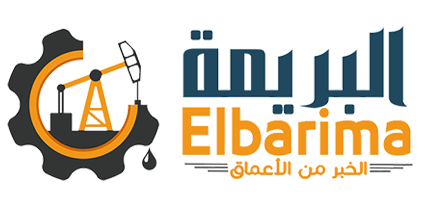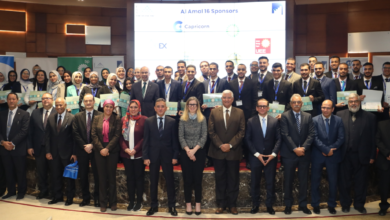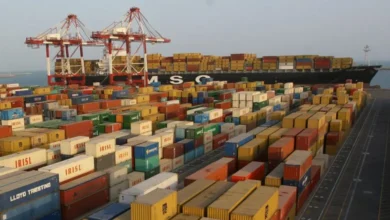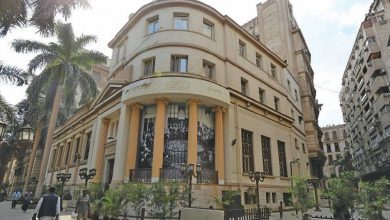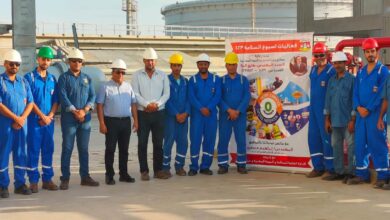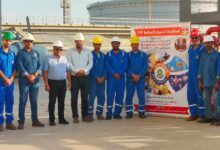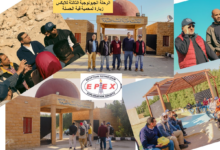Sayed El-Abnody to President Sisi and Minister of Petroleum: The National Mining Council is the Key to Egypt’s Renaissance

Today, we write to you out of a sense of belonging and a sincere desire to achieve a better future for Egypt
We therefore propose the establishment of a National Mining Council as a pivotal step towards advancing Egypt’s mining sector, tapping into the vast mineral wealth hidden within our land, and enhancing the economic and social value of this sector to become a cornerstone of sustainable development.
The National Mining Council: Egypt’s Strategic Position in the Mining World
By virtue of its geographic location and diverse geological environment, Egypt is one of the promising countries in the field of mining, especially in the Nubian Shield region, which holds vast reserves of gold, phosphate, and other precious metals.
If these resources are optimally utilized, Egypt could become a global hub for mining and exporting minerals, generating significant revenues and creating new job opportunities for its citizens.
However, the sector faces several challenges related to complex legislation and bureaucracy, which necessitates the creation of a specialized council that can enhance the business environment and make it more attractive to investors.
The Role of the National Mining Council in Economic Transformation
It is proposed that the council include a group of national and international experts, including specialists in environment, industry, finance, law, and national security, as well as foreign experts and private sector representatives with leading expertise in managing and developing mining sectors.
The council would serve as a higher reference, contributing to the formulation of policies and visions based on global best practices, ensuring the sustainable development of Egypt’s mineral resources while safeguarding national interests.
Ambitious Goals: A Plan to Attract $25 Billion in Investments
The National Mining Council will implement an ambitious plan aimed at attracting $25 billion in investments over five years, through policies that ensure a stimulating environment for mining, manufacturing, and exporting, while adding value to local resources.
This council will also serve as a mechanism to regulate and develop resource exploitation, ensuring that these resources provide sustainable returns for the benefit of the economy and future generations.
Strategies to Attract Foreign Investment
The council should work on developing a set of flexible policies that meet global standards, creating a favorable environment for attracting investors.
This includes simplifying regulatory procedures, developing legislation to facilitate exploration and mining, and offering incentives to leading companies. Such steps can encourage major international companies to enter the Egyptian market seriously, thereby enhancing the efficiency and competitiveness of the sector.
Modernizing Regulatory Frameworks
The mining sector in Egypt requires a comprehensive update of its legal and regulatory frameworks. Therefore, the council will work to restructure mining regulations and laws to make them more suitable for modern developments.
Establishing a flexible legal framework that keeps pace with the times will stimulate innovation and investment, helping to achieve real and sustainable economic growth and positioning Egypt on the map of leading mining countries.
Comprehensive Exploration Plans
The National Mining Council’s efforts should include launching a comprehensive exploration plan based on modern technologies, aiming to exploit underground mineral resources scientifically and systematically.
Activating geological missions using artificial intelligence and remote sensing technologies will increase the effectiveness of exploration operations, improve the exploitation of mineral resources, speed up decision-making, and drive production forward.
Enhancing Value through Local Manufacturing
One of the key principles the National Mining Council should adopt is enhancing the added value of local resources.
This can be achieved by developing local manufacturing industries that process and refine extracted minerals before exporting them, thus generating higher revenues and contributing to the development of complementary industries and creating more jobs.
Establishing specialized industrial complexes for mining and processing will help create an integrated economic value, support the development of related industries, such as chemical and engineering industries, and create a competitive value chain that meets the needs of both the local and global markets.
Training and Human Resource Development
Human talent is the true wealth that supports the growth and development of the sector. Therefore, the council should include training and development programs for human resources working in the Mineral Resources Authority, refining their skills and enhancing their expertise, to build a new generation of geological engineers and mining experts.
The importance of this investment lies in cooperation with global mining companies to provide specialized training programs aligned with modern technologies, ensuring knowledge sustainability and enhancing Egypt’s ability to compete in this field.
Benefiting from Leading Countries’ Experiences
Egypt can benefit from the experiences of leading countries in this field, such as Australia and Canada, which have successfully made significant progress in their mining sectors through international partnerships and adopting the latest technologies.
Therefore, the National Mining Council should adopt an open policy on knowledge exchange with global experts and participate in international conferences and specialized exhibitions.
Importance of International Relations and Modern Technologies
In a rapidly evolving global context, the council must stay in continuous contact with developments in mining technology worldwide, including modern environmental trends, sustainability, and artificial intelligence technologies.
Adopting these technologies in Egypt will enable the implementation of innovative production policies that increase operational efficiency and achieve sustainable development goals simultaneously.
Environmental Sustainability
The National Mining Council must prioritize environmental sustainability in all its activities. Applying strict environmental standards in all mining stages, from exploration to final processing, will protect the Egyptian environment, minimize potential harm, and ensure foreign companies’ adherence to environmental sustainability standards, safeguarding Egypt from any environmental risks related to mining activities.
Investing in the Future Economy: Rare Metals
Rare metals like lithium and cobalt are essential for the future economy, used in advanced technologies such as batteries and renewable energy. The role of the National Mining Council should include identifying and implementing strategies to utilize these rare metals found in Egypt, ensuring Egypt’s leading position in the future economy.
First: Egypt’s Mineral Wealth – Huge Potential Awaiting Exploitation
Egypt possesses a great diversity of mineral wealth, including:
- Precious metals: such as gold and silver.
- Basic metals: such as iron, copper, aluminum, and phosphate.
- Rare metals: such as tantalum and niobium, vital in technological industries.
- Energy resources: such as coal and uranium.
The Nubian Shield in the Eastern Desert is one of the richest areas in minerals, but current exploitation does not match the available potential.
Second: Current Challenges Facing the Mining Sector
- Organizational Structure and Bureaucracy: Complex procedures and difficulty obtaining licenses.
- Lack of Technology and Innovation: Reliance on traditional methods in exploration and extraction.
- Lack of Qualified Personnel: Insufficient training and specialized education in mining.
- Lack of Foreign Investments: Due to unclear laws and absence of incentives.
- Environmental Challenges: Failure to adhere to sustainability and environmental protection standards.
Third: National Mining Council – An Innovative Vision
- Digital Transformation and Advanced Technologies
- Utilizing artificial intelligence and big data analysis in exploration and identifying the most mineral-rich sites.
- Virtual and augmented reality technologies for training workers and remote monitoring of operations.
- Internet of Things (IoT) to connect equipment and improve operational efficiency.
- Sustainability and Circular Economy
- Green mining: Using renewable energy (solar and wind) in mining operations.
- Recycling of mineral waste: Turning waste into usable resources.
- Preserving biodiversity: Implementing plans to rehabilitate areas affected by mining.
- Strategic Partnerships and Foreign Investment
- Establishing partnerships with leading mining countries like Australia and Canada to benefit from their expertise.
- Providing tax and customs incentives to attract global companies.
- Creating special economic zones for mining with flexible laws and advanced infrastructure.
- Infrastructure and Logistics Development
- Improving transportation networks in mining areas.
- Establishing specialized ports to facilitate export and import operations.
- Developing communication services to ensure effective connectivity.
- Education, Training, and Capacity Building
- Establishing specialized institutes and academies in mining sciences and geology.
- Training programs in collaboration with global companies to qualify Egyptian talent.
- Scholarships and scientific missions for outstanding students to study abroad.
Fourth: Proposed Implementation Steps
Phase One: Establishment and Planning (0-6 months)
- Forming the National Mining Council and selecting its members.
- Evaluating the current situation and conducting comprehensive studies.
- Developing a national strategy defining objectives and indicators.
Phase Two: Legislation and Infrastructure (6 months – 1 year)
- Updating laws and regulations in cooperation with relevant authorities.
- Developing infrastructure in mining areas.
- Launching a digital platform to provide data and information.
Phase Three: Implementation and Expansion (1 – 5 years)
- Initiating new exploration projects using modern technologies.
- Establishing processing plants to enhance added value.
- Attracting foreign investments through promotional campaigns.
Phase Four: Continuous Evaluation and Development (after 5 years)
- Reviewing objectives and strategies based on achieved results.
- Updating plans to keep pace with technological and market changes.
- Enhancing international partnerships and expanding cooperation.
Fifth: Expected Economic and Social Impacts
- Increasing the mining sector’s contribution to the GDP by up to 10% within ten years.
- Creating direct and indirect employment for over 500,000 people.
- Improving the trade balance by increasing exports and reducing imports.
- Developing local communities and enhancing infrastructure and service levels.
- Strengthening Egypt’s position internationally as a leading investment destination in the mining sector.
Sixth: Environmental and Social Considerations
- Adhering to global environmental standards and preserving natural resources.
- Developing plans to rehabilitate areas affected by mining operations.
- Enhancing corporate social responsibility through development projects.
Seventh: Additional Proposals to Enhance the Sector
- Establishing a Metals Exchange
- Creating a local and international market for trading minerals, increasing transparency and investment appeal.
- Developing Mining Tourism
- Transforming old mines and geological museums into educational and cultural tourist sites.
- Organizing festivals and exhibitions to highlight Egypt’s mining history.
- Utilizing Marine Resources
- Exploring minerals at the bottom of the Red Sea, such as sulfur and rare metals.
- Investing in Research and Development
- Funding scientific research to develop new technologies and increase efficiency.
- Establishing innovation centers in collaboration with universities and research institutions.
- Promoting Transparency and Combating Corruption
- Implementing a transparent system for tenders and contracts.
- Using blockchain technologies to ensure integrity in financial and administrative operations.
Eighth: Leveraging the Fourth Industrial Revolution
- Automation and Robotics: To reduce risks and increase productivity.
- Remote Sensing Technologies: To monitor operations and enhance safety.
- 3D Printing: In mapping, manufacturing, and tools.
Ninth: Call for Action and Cooperation
Turning this vision into reality requires:
- Collaboration between public and private entities.
- Providing political and financial support to implement initiatives.
- Involving civil society to ensure comprehensive development.
In conclusion, establishing the National Mining Council is not merely a proposal but an invitation to adopt a forward-looking vision that utilizes national resources innovatively and sustainably. By implementing this strategy, Egypt can achieve a significant transformation in its economy and ensure a bright future for its citizens.
Therefore, we call upon President Sisi and the Minister of Petroleum and Mineral Resources to seriously consider this proposal and work towards its realization for Egypt’s economic renaissance. This message also stems from a belief in Egypt’s potential to achieve leadership in the mining sector and the desire to see our beloved nation take steady steps towards a better future.
